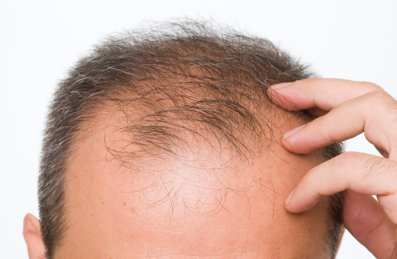Hair loss is a frustratingly common issue, and it can be even more frustrating when you don't know the cause. While genetics and stress can certainly play a role, did you know that a lack of certain vitamins can also contribute to hair loss? If you're experiencing hair loss, it's worth exploring whether a vitamin deficiency could be the culprit. Check out these potential vitamin deficiencies and what you can do to combat them.
What is Vitamin Deficiency?
Understanding the Basics
Vitamin deficiencies occur when your body isn't getting enough of a certain vitamin. This can happen for a variety of reasons, including poor diet, health conditions that affect nutrient absorption, and certain medications. The symptoms of a vitamin deficiency can vary depending on the specific vitamin, but some common signs include fatigue, weakness, pale skin, and hair loss.
If you suspect you might have a vitamin deficiency, it's important to see a doctor. They can run blood tests to confirm whether you're lacking in any vitamins and work with you to come up with a plan to boost your nutrient intake. In some cases, supplements or dietary changes may be necessary to address the deficiency.
Which Vitamins Can Contribute to Hair Loss?
Exploring the Possibilities
While any vitamin deficiency can potentially impact hair health, there are a few vitamins that are particularly known for their role in promoting hair growth. These include:
- Vitamin D: Vitamin D is essential for healthy bones, and it's also important for hair health. Some studies have suggested that a lack of vitamin D could contribute to hair loss, so it's worth looking into whether you're getting enough.
- Vitamin A: While vitamin A is important for overall health, too much or too little can result in hair loss. If you're lacking in vitamin A, you might notice dry, itchy skin, as well as hair loss.
- Vitamin E: This vitamin is an antioxidant and can help protect your cells from damage. It's also believed to play a role in promoting healthy hair growth.
- Vitamin B: The B vitamins are a group of vitamins that are important for overall health, and they can also help promote hair growth. Specifically, biotin (often referred to as vitamin B7) has been linked to strong, healthy hair.
How Can You Address a Vitamin Deficiency?
Tips and Ideas
If you're experiencing hair loss and suspect that a vitamin deficiency could be the cause, there are a few strategies you can try to address the issue. Some ideas include:
- Eating a nutrient-rich diet: One of the best ways to ensure you're getting enough vitamins is to eat a diet that's rich in nutrient-dense foods. Try to incorporate plenty of fruits and vegetables, lean protein, whole grains, and healthy fats into your meals.
- Taking supplements: If you're having trouble getting enough vitamins from your diet alone, supplements can be a good way to fill in the gaps. Just be sure to talk to your doctor before starting any new supplements to ensure they won't interact with any medications you're taking and to determine the correct dosage.
- Managing any underlying health conditions: If your vitamin deficiency is a result of an underlying health condition, such as celiac disease or Crohn's disease, managing that condition can help improve your nutrient absorption and ultimately improve your hair health.
- Reducing stress: While not directly related to vitamin deficiencies, stress can certainly impact your overall health and can even contribute to hair loss. Finding ways to manage stress, such as through meditation or exercise, can help improve your hair (and overall) health.
The Bottom Line
What You Need to Know
If you're experiencing hair loss, exploring whether a vitamin deficiency could be the cause is worth considering. While genetics and stress certainly play a role, a lack of certain vitamins can also contribute to hair loss. Talk to your doctor to see if you have any nutrient deficiencies and work together to come up with a plan to address them. With a little effort and attention to your nutrient intake, you may be able to improve your hair health and reduce hair loss over time.

Conclusion
Learn to Get Rid of Hair Issues with Vitamin Deficiency
Vitamin deficiencies can be a serious issue for your overall health and well-being, and they can also contribute to hair loss. By understanding which vitamins are important for hair health and exploring strategies for addressing any potential deficiencies, you can take control of your hair (and overall) health and see improvement over time. Just remember to work with your doctor to determine the best plan of action for your unique needs and circumstances. With a little effort and attention to your nutrient intake, you can promote healthy hair growth and reduce hair loss for good.
Find more articles about Hair Loss From Vitamin Deficiency